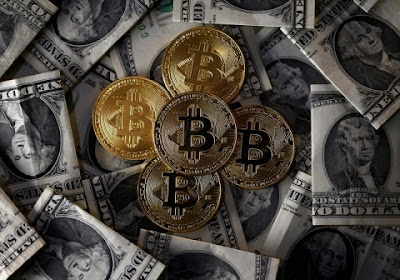A translation of this fatwa from Naseem al-Sham
Question:
Dear respected scholars, may the peace, mercy and blessings of Allah be upon you, and may Allah reward you and benefit you.
I would like to ask you about the ruling on the electronic currency, or money, known as Bitcoin and dealing and trading in it (by trading, I mean buying it when it is cheap and selling it when it is expensive). I apologise for my limited knowledge…I hope to receive a satisfactory answer, because I know and I fear the consequences of unlawful wealth and I do not want to be consuming anything unlawful. I don’t even want to consume something resembling that which is unlawful. May Allah reward you.
Answer: (Sheikh Muḥammad Tawfīq Ramaḍān)
And may the peace, mercy and blessings of Allah be upon you.
Bitcoin is a new type of money. We believe it is laying the foundation for those who control the circulation of money to have control over financial liquidity in a way that is more effective for them than paper money.
Until now, the peculiarities of this system have not been made clear, and therefore I think it is best to hold back from it and instead strive to find metallic money, with which a person can guarantee the soundness of financial liquidity, for fear that this development is a means for the those who control money to have more effective control over its movement.
Related:
Fatwa of the Grand Mufti of Egypt declaring Bitcoin unlawful (Arabic)
How to explain the Bitcoin bubble to young people
Could there be a government-controlled cryptocurrency after Bitcoin?
Is Bitcoin a means to digital slavery?

3 comments:
Assalaamu alaykum. What about the buying and selling of shares in the stock market? Is there a ruling on that?
Wa alaykum Assalaam,
If the shares are in companies that deal in that which is lawful, there is no riba and the companies' activities do not involve interest-bearing bank loans, it is permissible to purchase such shares and their profit is halal. Zakat is obligatory on their market value and on the profits added to the value of the shares. As for when the shares are for the sake of making a living, the zakat is limited to the value and does not apply to the profits.
[Translated from Fatawa Mu'asirah by Imam Wahbah az-Zuhayli (Damascus: Dar al-Fikr,1427/2006), p.155-156)
There seems to difference of opinion on the matter. Some may say investing in permissible types of business is fine regardless of debt, while others place a certain debt acceptability percentage, and then there is a view that makes it necessary to protest interest dealings to the company's board to absolve oneself of the blame as investor. Regarding, Imam Wahbah az-Zuhayli's view, one wonders how feasible investments in stocks would be given that most companies, as far as I know, are involved in debt transactions, at least where in the country I am from.
Post a Comment